Entrepreneurship and Small Business Management: Types and Impact
VerifiedAdded on 2023/01/05
|19
|5516
|38
Report
AI Summary
This report provides a comprehensive overview of entrepreneurship and small business management. It begins by defining and categorizing various types of entrepreneurial ventures, including small businesses, startups, and high-tech firms, and relates them to different typologies of entrepreneurship such as survival firms, high-tech firms, and lifestyle ventures. The report then analyzes the similarities and differences between public and private companies, and the impact of both macro and small businesses on the economy, highlighting the importance of small businesses and startups in driving economic growth and employment. Furthermore, the report delves into the characteristic traits and skills that differentiate successful entrepreneurs from other business managers, and discusses how background can either hinder or foster entrepreneurial endeavors. The report concludes by summarizing key findings and emphasizing the significance of entrepreneurship in driving innovation, creating jobs, and shaping the economic landscape.
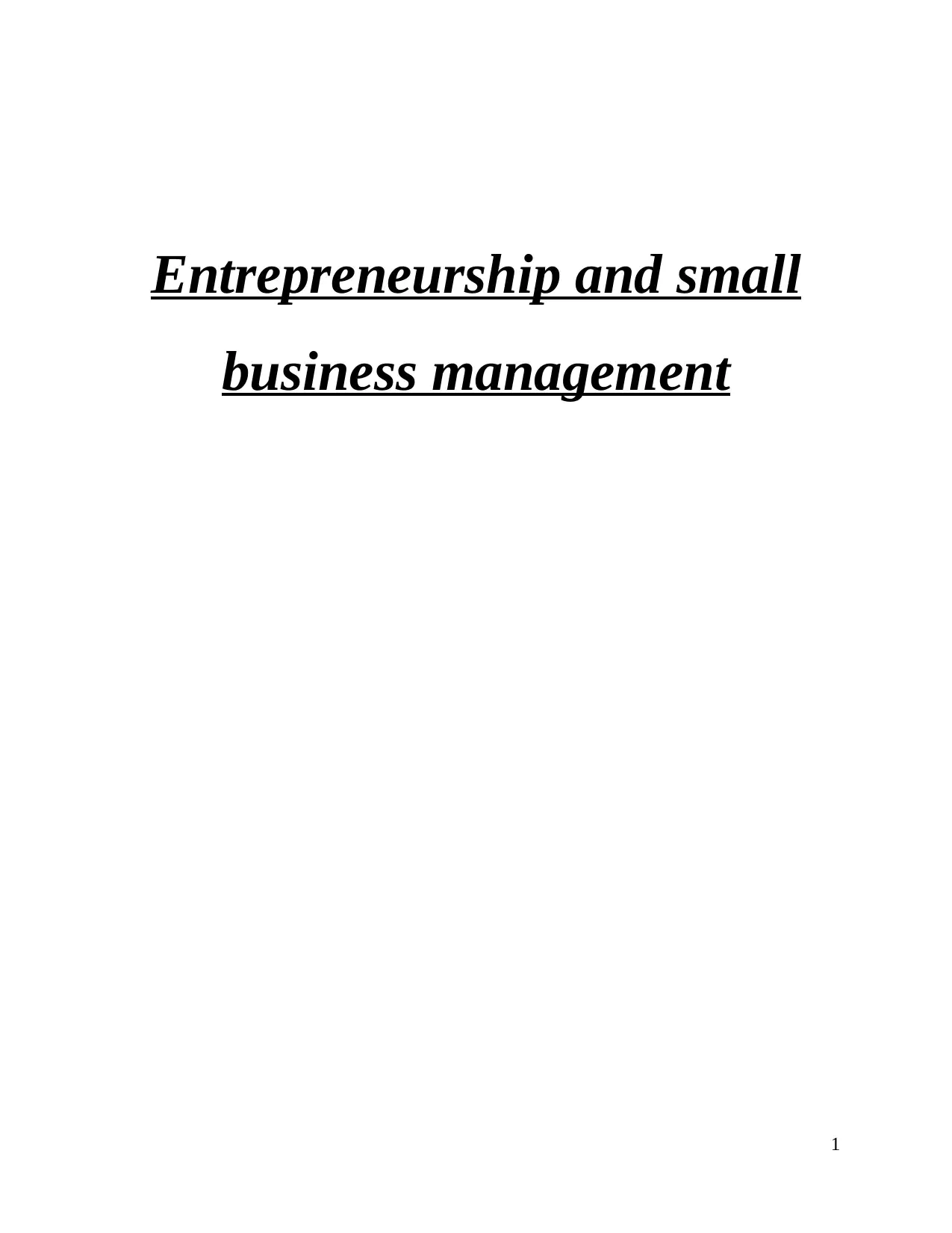
Entrepreneurship and small
business management
1
business management
1
Paraphrase This Document
Need a fresh take? Get an instant paraphrase of this document with our AI Paraphraser

TABLE OF CONTENTS
INTRODUCTION...........................................................................................................................3
PART 1............................................................................................................................................3
Types of entrepreneurial ventures and they relate to typology of entrepreneurship...................3
Similarities and differences.........................................................................................................5
PART B...........................................................................................................................................6
Impact of macro and small businesses on economy....................................................................6
Importance of small business and start-ups for growth of social economy.................................8
Characteristic traits and skills of successful entrepreneurs that differentiate them from other
business managers.......................................................................................................................9
Background can hinder or foster entrepreneurship....................................................................13
CONCLUSION..............................................................................................................................14
REFERENCES..............................................................................................................................16
2
INTRODUCTION...........................................................................................................................3
PART 1............................................................................................................................................3
Types of entrepreneurial ventures and they relate to typology of entrepreneurship...................3
Similarities and differences.........................................................................................................5
PART B...........................................................................................................................................6
Impact of macro and small businesses on economy....................................................................6
Importance of small business and start-ups for growth of social economy.................................8
Characteristic traits and skills of successful entrepreneurs that differentiate them from other
business managers.......................................................................................................................9
Background can hinder or foster entrepreneurship....................................................................13
CONCLUSION..............................................................................................................................14
REFERENCES..............................................................................................................................16
2
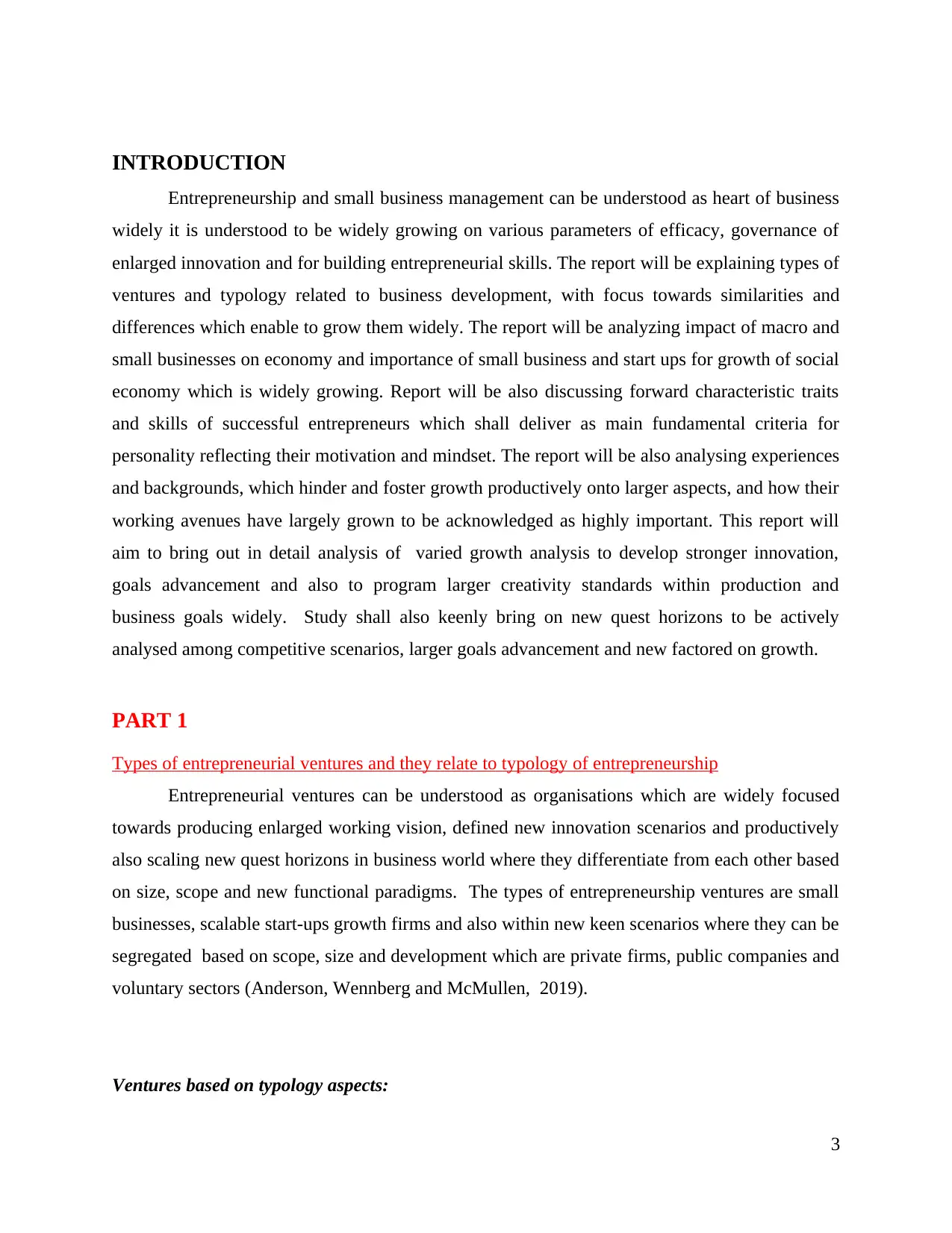
INTRODUCTION
Entrepreneurship and small business management can be understood as heart of business
widely it is understood to be widely growing on various parameters of efficacy, governance of
enlarged innovation and for building entrepreneurial skills. The report will be explaining types of
ventures and typology related to business development, with focus towards similarities and
differences which enable to grow them widely. The report will be analyzing impact of macro and
small businesses on economy and importance of small business and start ups for growth of social
economy which is widely growing. Report will be also discussing forward characteristic traits
and skills of successful entrepreneurs which shall deliver as main fundamental criteria for
personality reflecting their motivation and mindset. The report will be also analysing experiences
and backgrounds, which hinder and foster growth productively onto larger aspects, and how their
working avenues have largely grown to be acknowledged as highly important. This report will
aim to bring out in detail analysis of varied growth analysis to develop stronger innovation,
goals advancement and also to program larger creativity standards within production and
business goals widely. Study shall also keenly bring on new quest horizons to be actively
analysed among competitive scenarios, larger goals advancement and new factored on growth.
PART 1
Types of entrepreneurial ventures and they relate to typology of entrepreneurship
Entrepreneurial ventures can be understood as organisations which are widely focused
towards producing enlarged working vision, defined new innovation scenarios and productively
also scaling new quest horizons in business world where they differentiate from each other based
on size, scope and new functional paradigms. The types of entrepreneurship ventures are small
businesses, scalable start-ups growth firms and also within new keen scenarios where they can be
segregated based on scope, size and development which are private firms, public companies and
voluntary sectors (Anderson, Wennberg and McMullen, 2019).
Ventures based on typology aspects:
3
Entrepreneurship and small business management can be understood as heart of business
widely it is understood to be widely growing on various parameters of efficacy, governance of
enlarged innovation and for building entrepreneurial skills. The report will be explaining types of
ventures and typology related to business development, with focus towards similarities and
differences which enable to grow them widely. The report will be analyzing impact of macro and
small businesses on economy and importance of small business and start ups for growth of social
economy which is widely growing. Report will be also discussing forward characteristic traits
and skills of successful entrepreneurs which shall deliver as main fundamental criteria for
personality reflecting their motivation and mindset. The report will be also analysing experiences
and backgrounds, which hinder and foster growth productively onto larger aspects, and how their
working avenues have largely grown to be acknowledged as highly important. This report will
aim to bring out in detail analysis of varied growth analysis to develop stronger innovation,
goals advancement and also to program larger creativity standards within production and
business goals widely. Study shall also keenly bring on new quest horizons to be actively
analysed among competitive scenarios, larger goals advancement and new factored on growth.
PART 1
Types of entrepreneurial ventures and they relate to typology of entrepreneurship
Entrepreneurial ventures can be understood as organisations which are widely focused
towards producing enlarged working vision, defined new innovation scenarios and productively
also scaling new quest horizons in business world where they differentiate from each other based
on size, scope and new functional paradigms. The types of entrepreneurship ventures are small
businesses, scalable start-ups growth firms and also within new keen scenarios where they can be
segregated based on scope, size and development which are private firms, public companies and
voluntary sectors (Anderson, Wennberg and McMullen, 2019).
Ventures based on typology aspects:
3
⊘ This is a preview!⊘
Do you want full access?
Subscribe today to unlock all pages.

Trusted by 1+ million students worldwide
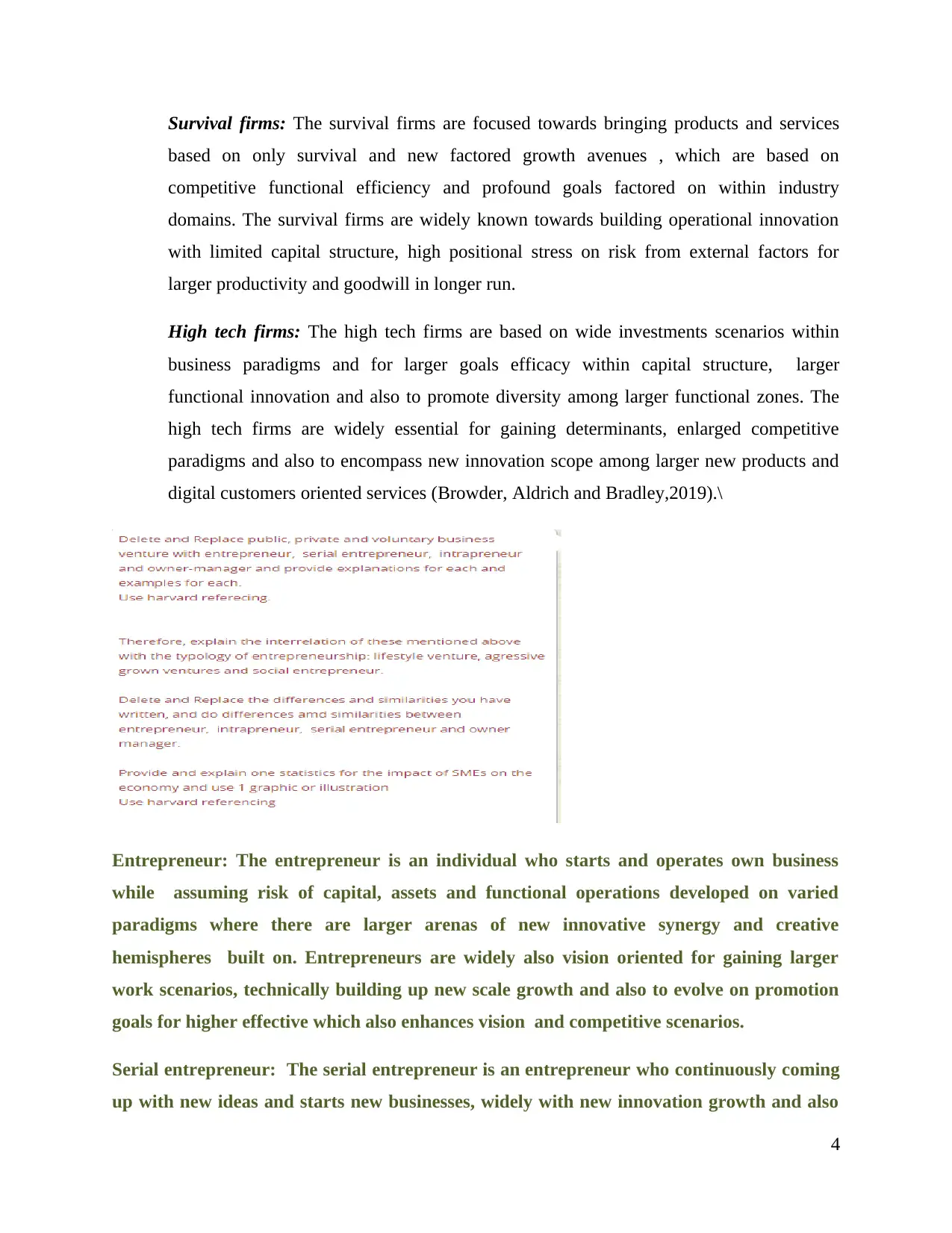
Survival firms: The survival firms are focused towards bringing products and services
based on only survival and new factored growth avenues , which are based on
competitive functional efficiency and profound goals factored on within industry
domains. The survival firms are widely known towards building operational innovation
with limited capital structure, high positional stress on risk from external factors for
larger productivity and goodwill in longer run.
High tech firms: The high tech firms are based on wide investments scenarios within
business paradigms and for larger goals efficacy within capital structure, larger
functional innovation and also to promote diversity among larger functional zones. The
high tech firms are widely essential for gaining determinants, enlarged competitive
paradigms and also to encompass new innovation scope among larger new products and
digital customers oriented services (Browder, Aldrich and Bradley,2019).\
Entrepreneur: The entrepreneur is an individual who starts and operates own business
while assuming risk of capital, assets and functional operations developed on varied
paradigms where there are larger arenas of new innovative synergy and creative
hemispheres built on. Entrepreneurs are widely also vision oriented for gaining larger
work scenarios, technically building up new scale growth and also to evolve on promotion
goals for higher effective which also enhances vision and competitive scenarios.
Serial entrepreneur: The serial entrepreneur is an entrepreneur who continuously coming
up with new ideas and starts new businesses, widely with new innovation growth and also
4
based on only survival and new factored growth avenues , which are based on
competitive functional efficiency and profound goals factored on within industry
domains. The survival firms are widely known towards building operational innovation
with limited capital structure, high positional stress on risk from external factors for
larger productivity and goodwill in longer run.
High tech firms: The high tech firms are based on wide investments scenarios within
business paradigms and for larger goals efficacy within capital structure, larger
functional innovation and also to promote diversity among larger functional zones. The
high tech firms are widely essential for gaining determinants, enlarged competitive
paradigms and also to encompass new innovation scope among larger new products and
digital customers oriented services (Browder, Aldrich and Bradley,2019).\
Entrepreneur: The entrepreneur is an individual who starts and operates own business
while assuming risk of capital, assets and functional operations developed on varied
paradigms where there are larger arenas of new innovative synergy and creative
hemispheres built on. Entrepreneurs are widely also vision oriented for gaining larger
work scenarios, technically building up new scale growth and also to evolve on promotion
goals for higher effective which also enhances vision and competitive scenarios.
Serial entrepreneur: The serial entrepreneur is an entrepreneur who continuously coming
up with new ideas and starts new businesses, widely with new innovation growth and also
4
Paraphrase This Document
Need a fresh take? Get an instant paraphrase of this document with our AI Paraphraser
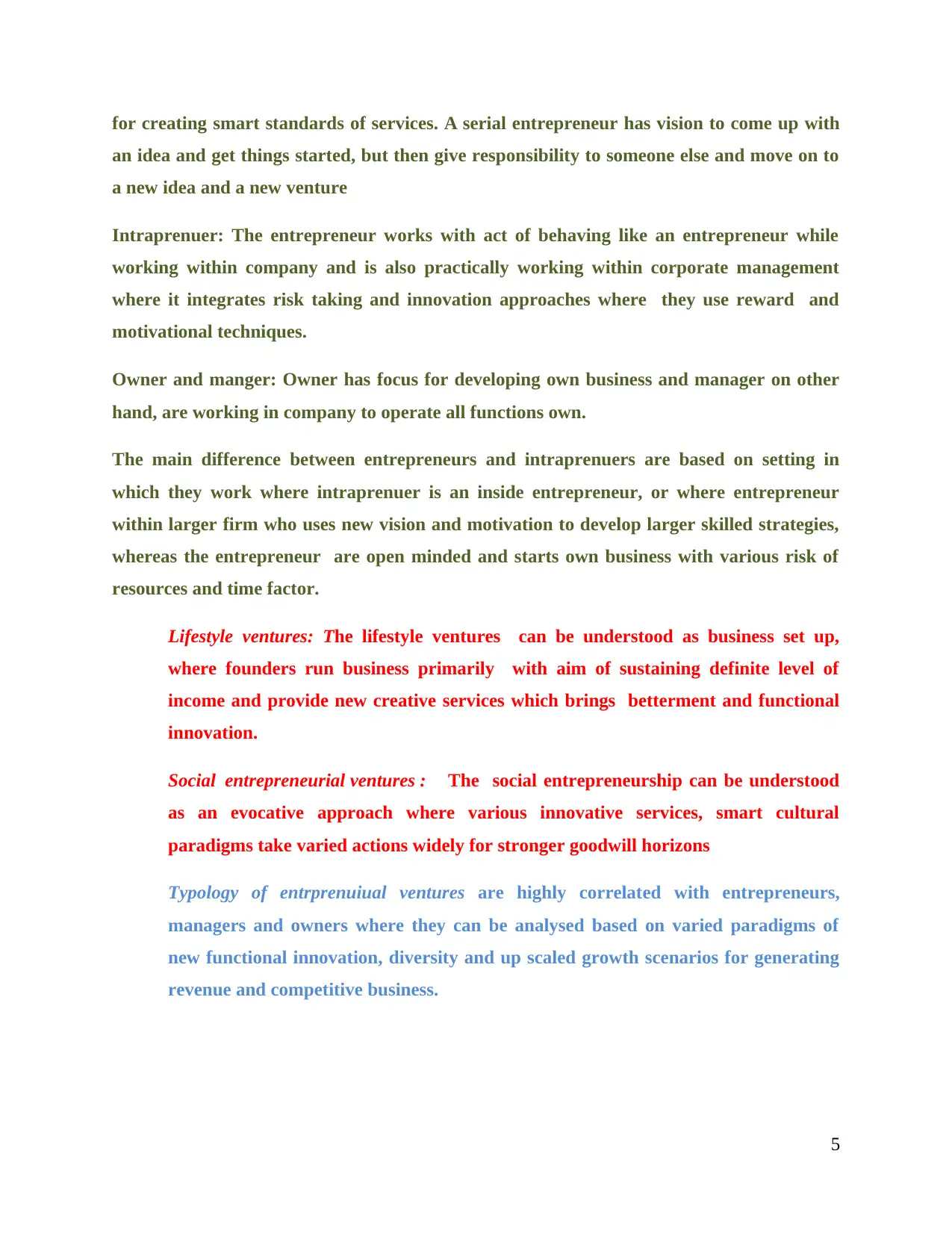
for creating smart standards of services. A serial entrepreneur has vision to come up with
an idea and get things started, but then give responsibility to someone else and move on to
a new idea and a new venture
Intraprenuer: The entrepreneur works with act of behaving like an entrepreneur while
working within company and is also practically working within corporate management
where it integrates risk taking and innovation approaches where they use reward and
motivational techniques.
Owner and manger: Owner has focus for developing own business and manager on other
hand, are working in company to operate all functions own.
The main difference between entrepreneurs and intraprenuers are based on setting in
which they work where intraprenuer is an inside entrepreneur, or where entrepreneur
within larger firm who uses new vision and motivation to develop larger skilled strategies,
whereas the entrepreneur are open minded and starts own business with various risk of
resources and time factor.
Lifestyle ventures: The lifestyle ventures can be understood as business set up,
where founders run business primarily with aim of sustaining definite level of
income and provide new creative services which brings betterment and functional
innovation.
Social entrepreneurial ventures : The social entrepreneurship can be understood
as an evocative approach where various innovative services, smart cultural
paradigms take varied actions widely for stronger goodwill horizons
Typology of entrprenuiual ventures are highly correlated with entrepreneurs,
managers and owners where they can be analysed based on varied paradigms of
new functional innovation, diversity and up scaled growth scenarios for generating
revenue and competitive business.
5
an idea and get things started, but then give responsibility to someone else and move on to
a new idea and a new venture
Intraprenuer: The entrepreneur works with act of behaving like an entrepreneur while
working within company and is also practically working within corporate management
where it integrates risk taking and innovation approaches where they use reward and
motivational techniques.
Owner and manger: Owner has focus for developing own business and manager on other
hand, are working in company to operate all functions own.
The main difference between entrepreneurs and intraprenuers are based on setting in
which they work where intraprenuer is an inside entrepreneur, or where entrepreneur
within larger firm who uses new vision and motivation to develop larger skilled strategies,
whereas the entrepreneur are open minded and starts own business with various risk of
resources and time factor.
Lifestyle ventures: The lifestyle ventures can be understood as business set up,
where founders run business primarily with aim of sustaining definite level of
income and provide new creative services which brings betterment and functional
innovation.
Social entrepreneurial ventures : The social entrepreneurship can be understood
as an evocative approach where various innovative services, smart cultural
paradigms take varied actions widely for stronger goodwill horizons
Typology of entrprenuiual ventures are highly correlated with entrepreneurs,
managers and owners where they can be analysed based on varied paradigms of
new functional innovation, diversity and up scaled growth scenarios for generating
revenue and competitive business.
5
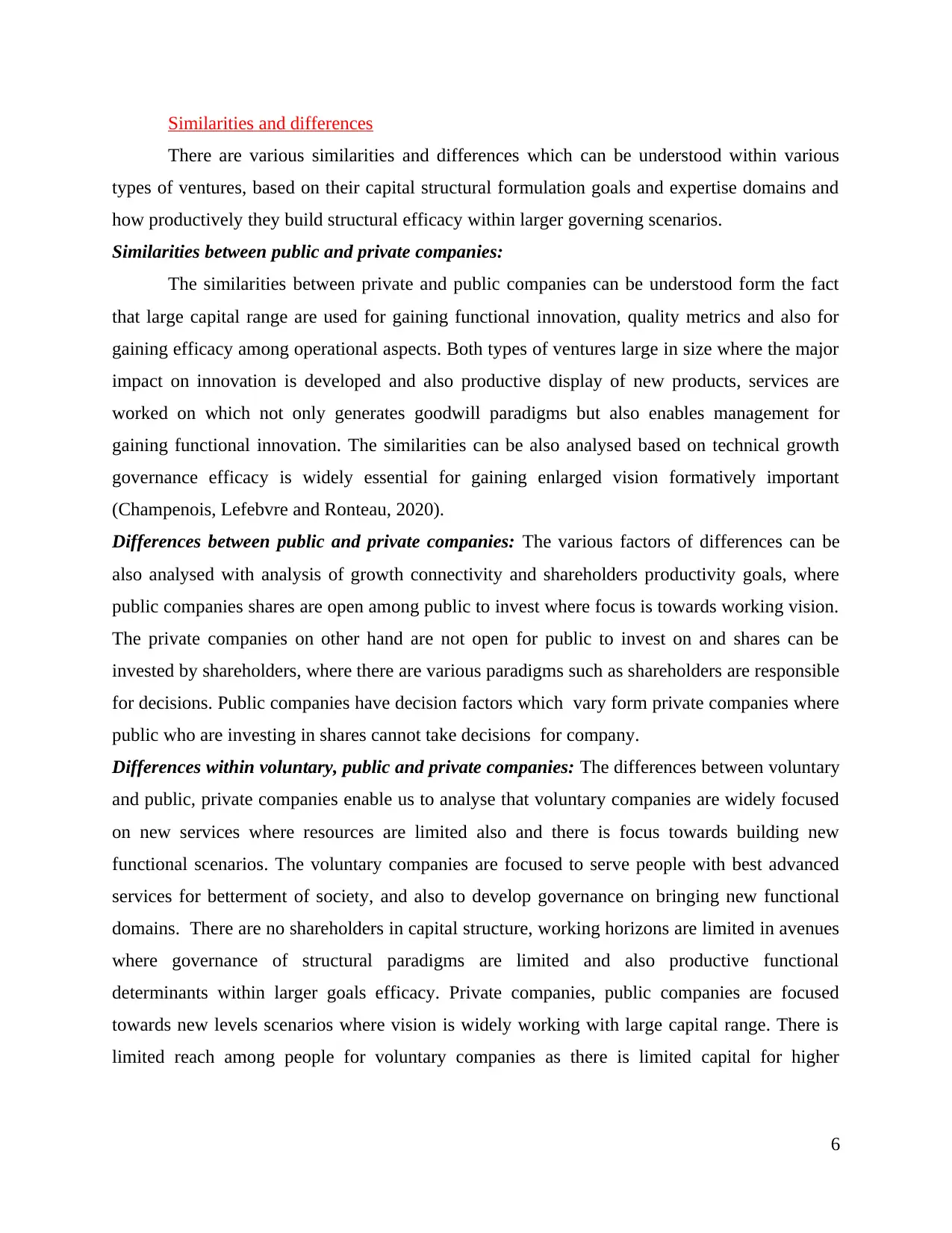
Similarities and differences
There are various similarities and differences which can be understood within various
types of ventures, based on their capital structural formulation goals and expertise domains and
how productively they build structural efficacy within larger governing scenarios.
Similarities between public and private companies:
The similarities between private and public companies can be understood form the fact
that large capital range are used for gaining functional innovation, quality metrics and also for
gaining efficacy among operational aspects. Both types of ventures large in size where the major
impact on innovation is developed and also productive display of new products, services are
worked on which not only generates goodwill paradigms but also enables management for
gaining functional innovation. The similarities can be also analysed based on technical growth
governance efficacy is widely essential for gaining enlarged vision formatively important
(Champenois, Lefebvre and Ronteau, 2020).
Differences between public and private companies: The various factors of differences can be
also analysed with analysis of growth connectivity and shareholders productivity goals, where
public companies shares are open among public to invest where focus is towards working vision.
The private companies on other hand are not open for public to invest on and shares can be
invested by shareholders, where there are various paradigms such as shareholders are responsible
for decisions. Public companies have decision factors which vary form private companies where
public who are investing in shares cannot take decisions for company.
Differences within voluntary, public and private companies: The differences between voluntary
and public, private companies enable us to analyse that voluntary companies are widely focused
on new services where resources are limited also and there is focus towards building new
functional scenarios. The voluntary companies are focused to serve people with best advanced
services for betterment of society, and also to develop governance on bringing new functional
domains. There are no shareholders in capital structure, working horizons are limited in avenues
where governance of structural paradigms are limited and also productive functional
determinants within larger goals efficacy. Private companies, public companies are focused
towards new levels scenarios where vision is widely working with large capital range. There is
limited reach among people for voluntary companies as there is limited capital for higher
6
There are various similarities and differences which can be understood within various
types of ventures, based on their capital structural formulation goals and expertise domains and
how productively they build structural efficacy within larger governing scenarios.
Similarities between public and private companies:
The similarities between private and public companies can be understood form the fact
that large capital range are used for gaining functional innovation, quality metrics and also for
gaining efficacy among operational aspects. Both types of ventures large in size where the major
impact on innovation is developed and also productive display of new products, services are
worked on which not only generates goodwill paradigms but also enables management for
gaining functional innovation. The similarities can be also analysed based on technical growth
governance efficacy is widely essential for gaining enlarged vision formatively important
(Champenois, Lefebvre and Ronteau, 2020).
Differences between public and private companies: The various factors of differences can be
also analysed with analysis of growth connectivity and shareholders productivity goals, where
public companies shares are open among public to invest where focus is towards working vision.
The private companies on other hand are not open for public to invest on and shares can be
invested by shareholders, where there are various paradigms such as shareholders are responsible
for decisions. Public companies have decision factors which vary form private companies where
public who are investing in shares cannot take decisions for company.
Differences within voluntary, public and private companies: The differences between voluntary
and public, private companies enable us to analyse that voluntary companies are widely focused
on new services where resources are limited also and there is focus towards building new
functional scenarios. The voluntary companies are focused to serve people with best advanced
services for betterment of society, and also to develop governance on bringing new functional
domains. There are no shareholders in capital structure, working horizons are limited in avenues
where governance of structural paradigms are limited and also productive functional
determinants within larger goals efficacy. Private companies, public companies are focused
towards new levels scenarios where vision is widely working with large capital range. There is
limited reach among people for voluntary companies as there is limited capital for higher
6
⊘ This is a preview!⊘
Do you want full access?
Subscribe today to unlock all pages.

Trusted by 1+ million students worldwide
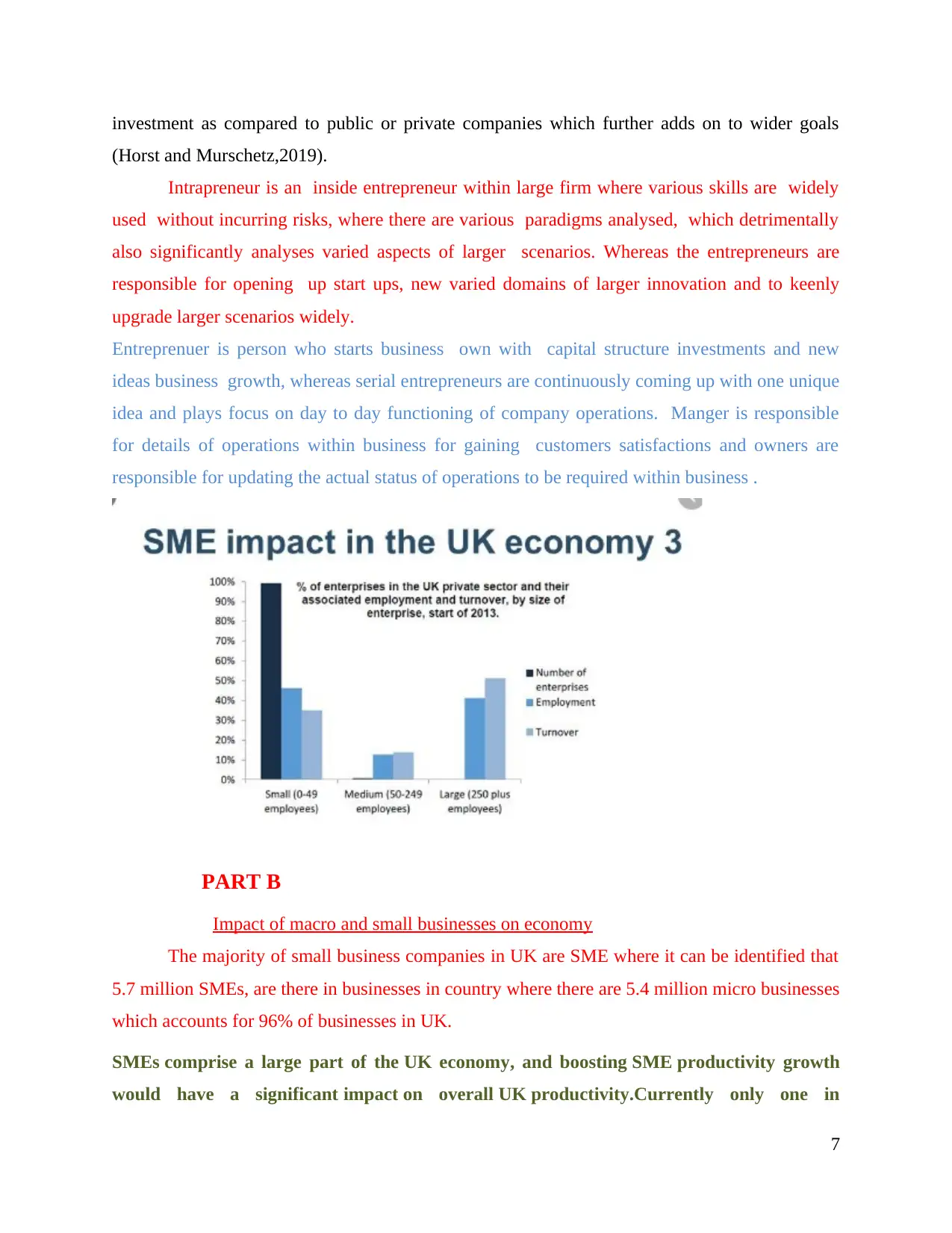
investment as compared to public or private companies which further adds on to wider goals
(Horst and Murschetz,2019).
Intrapreneur is an inside entrepreneur within large firm where various skills are widely
used without incurring risks, where there are various paradigms analysed, which detrimentally
also significantly analyses varied aspects of larger scenarios. Whereas the entrepreneurs are
responsible for opening up start ups, new varied domains of larger innovation and to keenly
upgrade larger scenarios widely.
Entreprenuer is person who starts business own with capital structure investments and new
ideas business growth, whereas serial entrepreneurs are continuously coming up with one unique
idea and plays focus on day to day functioning of company operations. Manger is responsible
for details of operations within business for gaining customers satisfactions and owners are
responsible for updating the actual status of operations to be required within business .
PART B
Impact of macro and small businesses on economy
The majority of small business companies in UK are SME where it can be identified that
5.7 million SMEs, are there in businesses in country where there are 5.4 million micro businesses
which accounts for 96% of businesses in UK.
SMEs comprise a large part of the UK economy, and boosting SME productivity growth
would have a significant impact on overall UK productivity.Currently only one in
7
(Horst and Murschetz,2019).
Intrapreneur is an inside entrepreneur within large firm where various skills are widely
used without incurring risks, where there are various paradigms analysed, which detrimentally
also significantly analyses varied aspects of larger scenarios. Whereas the entrepreneurs are
responsible for opening up start ups, new varied domains of larger innovation and to keenly
upgrade larger scenarios widely.
Entreprenuer is person who starts business own with capital structure investments and new
ideas business growth, whereas serial entrepreneurs are continuously coming up with one unique
idea and plays focus on day to day functioning of company operations. Manger is responsible
for details of operations within business for gaining customers satisfactions and owners are
responsible for updating the actual status of operations to be required within business .
PART B
Impact of macro and small businesses on economy
The majority of small business companies in UK are SME where it can be identified that
5.7 million SMEs, are there in businesses in country where there are 5.4 million micro businesses
which accounts for 96% of businesses in UK.
SMEs comprise a large part of the UK economy, and boosting SME productivity growth
would have a significant impact on overall UK productivity.Currently only one in
7
Paraphrase This Document
Need a fresh take? Get an instant paraphrase of this document with our AI Paraphraser
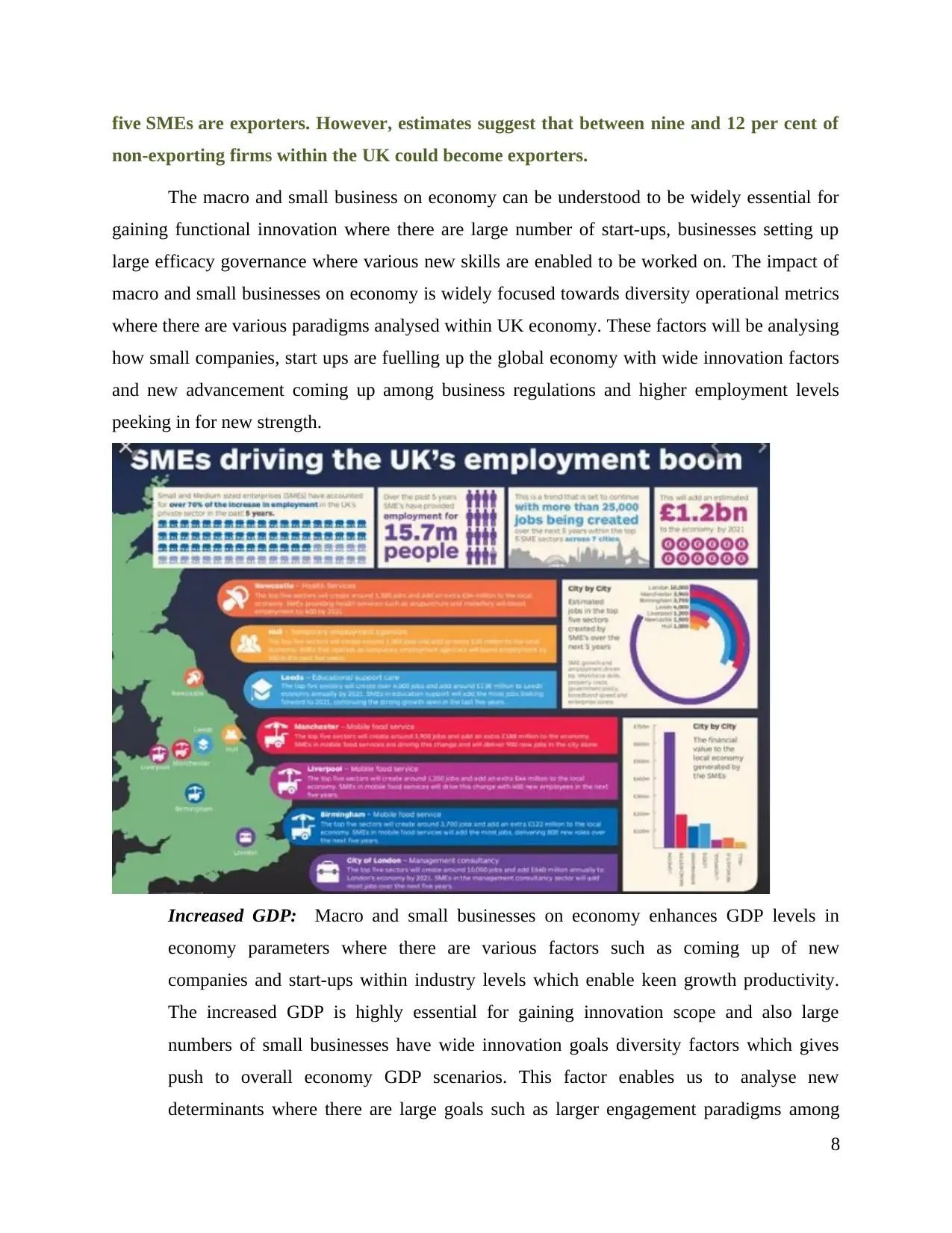
five SMEs are exporters. However, estimates suggest that between nine and 12 per cent of
non-exporting firms within the UK could become exporters.
The macro and small business on economy can be understood to be widely essential for
gaining functional innovation where there are large number of start-ups, businesses setting up
large efficacy governance where various new skills are enabled to be worked on. The impact of
macro and small businesses on economy is widely focused towards diversity operational metrics
where there are various paradigms analysed within UK economy. These factors will be analysing
how small companies, start ups are fuelling up the global economy with wide innovation factors
and new advancement coming up among business regulations and higher employment levels
peeking in for new strength.
Increased GDP: Macro and small businesses on economy enhances GDP levels in
economy parameters where there are various factors such as coming up of new
companies and start-ups within industry levels which enable keen growth productivity.
The increased GDP is highly essential for gaining innovation scope and also large
numbers of small businesses have wide innovation goals diversity factors which gives
push to overall economy GDP scenarios. This factor enables us to analyse new
determinants where there are large goals such as larger engagement paradigms among
8
non-exporting firms within the UK could become exporters.
The macro and small business on economy can be understood to be widely essential for
gaining functional innovation where there are large number of start-ups, businesses setting up
large efficacy governance where various new skills are enabled to be worked on. The impact of
macro and small businesses on economy is widely focused towards diversity operational metrics
where there are various paradigms analysed within UK economy. These factors will be analysing
how small companies, start ups are fuelling up the global economy with wide innovation factors
and new advancement coming up among business regulations and higher employment levels
peeking in for new strength.
Increased GDP: Macro and small businesses on economy enhances GDP levels in
economy parameters where there are various factors such as coming up of new
companies and start-ups within industry levels which enable keen growth productivity.
The increased GDP is highly essential for gaining innovation scope and also large
numbers of small businesses have wide innovation goals diversity factors which gives
push to overall economy GDP scenarios. This factor enables us to analyse new
determinants where there are large goals such as larger engagement paradigms among
8
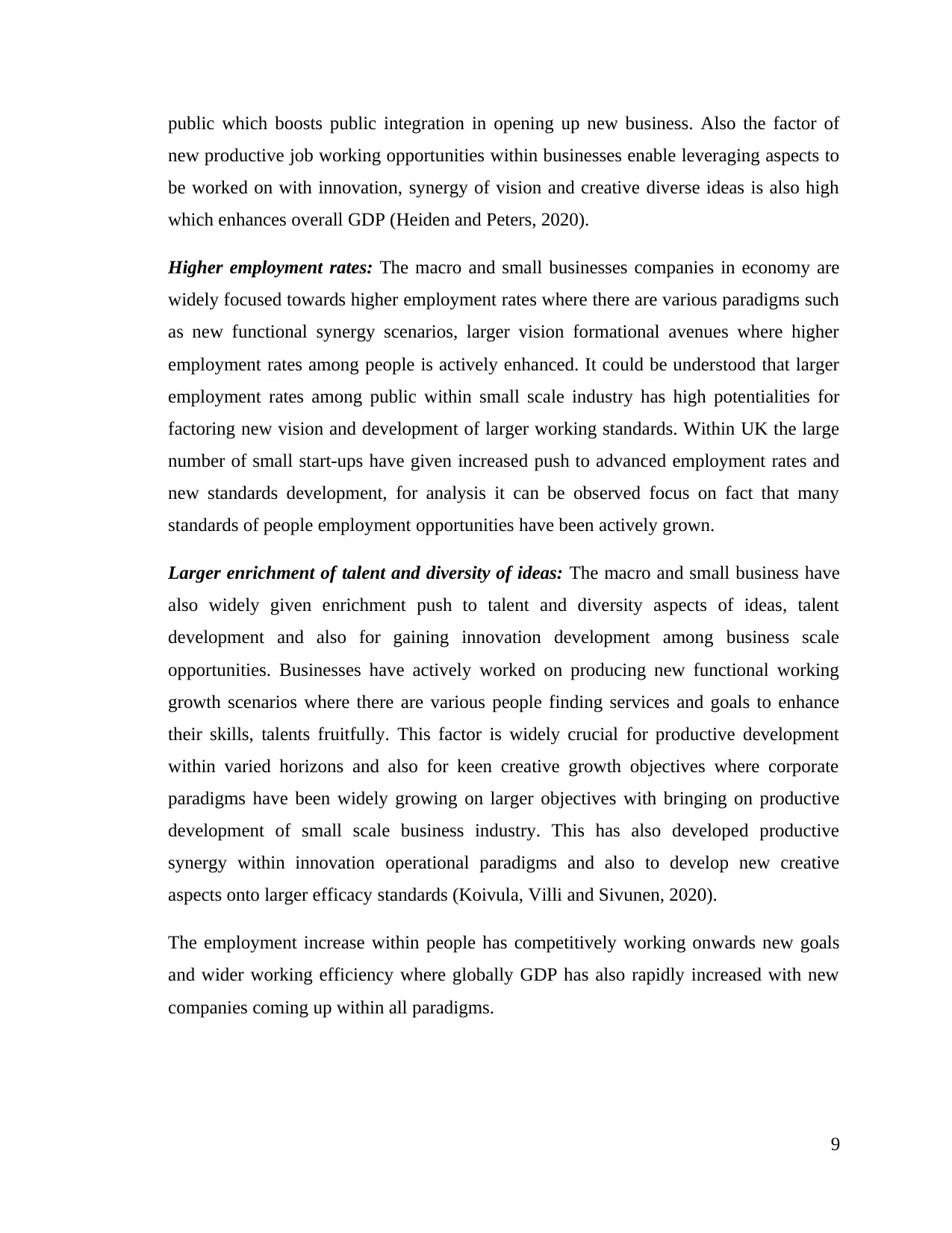
public which boosts public integration in opening up new business. Also the factor of
new productive job working opportunities within businesses enable leveraging aspects to
be worked on with innovation, synergy of vision and creative diverse ideas is also high
which enhances overall GDP (Heiden and Peters, 2020).
Higher employment rates: The macro and small businesses companies in economy are
widely focused towards higher employment rates where there are various paradigms such
as new functional synergy scenarios, larger vision formational avenues where higher
employment rates among people is actively enhanced. It could be understood that larger
employment rates among public within small scale industry has high potentialities for
factoring new vision and development of larger working standards. Within UK the large
number of small start-ups have given increased push to advanced employment rates and
new standards development, for analysis it can be observed focus on fact that many
standards of people employment opportunities have been actively grown.
Larger enrichment of talent and diversity of ideas: The macro and small business have
also widely given enrichment push to talent and diversity aspects of ideas, talent
development and also for gaining innovation development among business scale
opportunities. Businesses have actively worked on producing new functional working
growth scenarios where there are various people finding services and goals to enhance
their skills, talents fruitfully. This factor is widely crucial for productive development
within varied horizons and also for keen creative growth objectives where corporate
paradigms have been widely growing on larger objectives with bringing on productive
development of small scale business industry. This has also developed productive
synergy within innovation operational paradigms and also to develop new creative
aspects onto larger efficacy standards (Koivula, Villi and Sivunen, 2020).
The employment increase within people has competitively working onwards new goals
and wider working efficiency where globally GDP has also rapidly increased with new
companies coming up within all paradigms.
9
new productive job working opportunities within businesses enable leveraging aspects to
be worked on with innovation, synergy of vision and creative diverse ideas is also high
which enhances overall GDP (Heiden and Peters, 2020).
Higher employment rates: The macro and small businesses companies in economy are
widely focused towards higher employment rates where there are various paradigms such
as new functional synergy scenarios, larger vision formational avenues where higher
employment rates among people is actively enhanced. It could be understood that larger
employment rates among public within small scale industry has high potentialities for
factoring new vision and development of larger working standards. Within UK the large
number of small start-ups have given increased push to advanced employment rates and
new standards development, for analysis it can be observed focus on fact that many
standards of people employment opportunities have been actively grown.
Larger enrichment of talent and diversity of ideas: The macro and small business have
also widely given enrichment push to talent and diversity aspects of ideas, talent
development and also for gaining innovation development among business scale
opportunities. Businesses have actively worked on producing new functional working
growth scenarios where there are various people finding services and goals to enhance
their skills, talents fruitfully. This factor is widely crucial for productive development
within varied horizons and also for keen creative growth objectives where corporate
paradigms have been widely growing on larger objectives with bringing on productive
development of small scale business industry. This has also developed productive
synergy within innovation operational paradigms and also to develop new creative
aspects onto larger efficacy standards (Koivula, Villi and Sivunen, 2020).
The employment increase within people has competitively working onwards new goals
and wider working efficiency where globally GDP has also rapidly increased with new
companies coming up within all paradigms.
9
⊘ This is a preview!⊘
Do you want full access?
Subscribe today to unlock all pages.

Trusted by 1+ million students worldwide
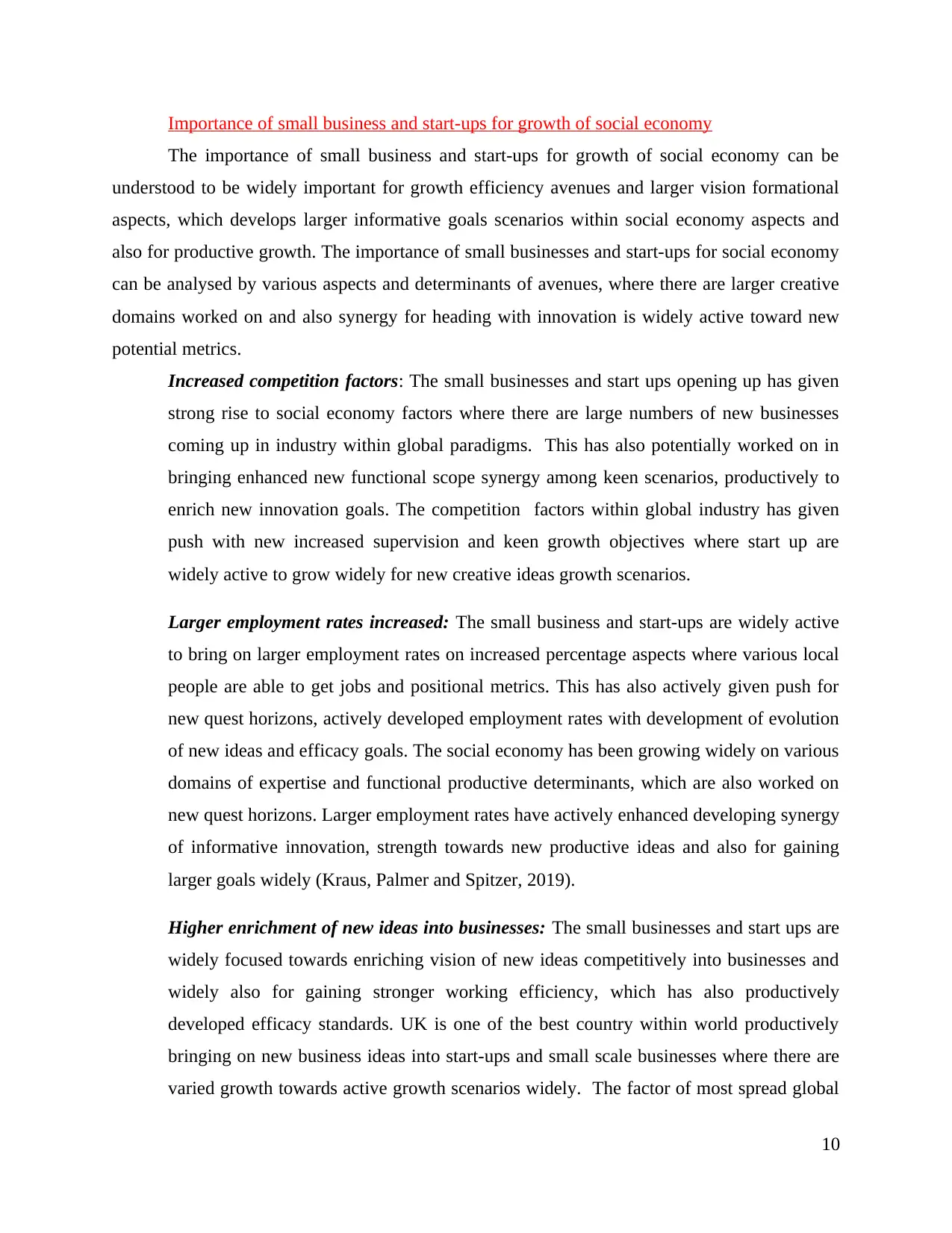
Importance of small business and start-ups for growth of social economy
The importance of small business and start-ups for growth of social economy can be
understood to be widely important for growth efficiency avenues and larger vision formational
aspects, which develops larger informative goals scenarios within social economy aspects and
also for productive growth. The importance of small businesses and start-ups for social economy
can be analysed by various aspects and determinants of avenues, where there are larger creative
domains worked on and also synergy for heading with innovation is widely active toward new
potential metrics.
Increased competition factors: The small businesses and start ups opening up has given
strong rise to social economy factors where there are large numbers of new businesses
coming up in industry within global paradigms. This has also potentially worked on in
bringing enhanced new functional scope synergy among keen scenarios, productively to
enrich new innovation goals. The competition factors within global industry has given
push with new increased supervision and keen growth objectives where start up are
widely active to grow widely for new creative ideas growth scenarios.
Larger employment rates increased: The small business and start-ups are widely active
to bring on larger employment rates on increased percentage aspects where various local
people are able to get jobs and positional metrics. This has also actively given push for
new quest horizons, actively developed employment rates with development of evolution
of new ideas and efficacy goals. The social economy has been growing widely on various
domains of expertise and functional productive determinants, which are also worked on
new quest horizons. Larger employment rates have actively enhanced developing synergy
of informative innovation, strength towards new productive ideas and also for gaining
larger goals widely (Kraus, Palmer and Spitzer, 2019).
Higher enrichment of new ideas into businesses: The small businesses and start ups are
widely focused towards enriching vision of new ideas competitively into businesses and
widely also for gaining stronger working efficiency, which has also productively
developed efficacy standards. UK is one of the best country within world productively
bringing on new business ideas into start-ups and small scale businesses where there are
varied growth towards active growth scenarios widely. The factor of most spread global
10
The importance of small business and start-ups for growth of social economy can be
understood to be widely important for growth efficiency avenues and larger vision formational
aspects, which develops larger informative goals scenarios within social economy aspects and
also for productive growth. The importance of small businesses and start-ups for social economy
can be analysed by various aspects and determinants of avenues, where there are larger creative
domains worked on and also synergy for heading with innovation is widely active toward new
potential metrics.
Increased competition factors: The small businesses and start ups opening up has given
strong rise to social economy factors where there are large numbers of new businesses
coming up in industry within global paradigms. This has also potentially worked on in
bringing enhanced new functional scope synergy among keen scenarios, productively to
enrich new innovation goals. The competition factors within global industry has given
push with new increased supervision and keen growth objectives where start up are
widely active to grow widely for new creative ideas growth scenarios.
Larger employment rates increased: The small business and start-ups are widely active
to bring on larger employment rates on increased percentage aspects where various local
people are able to get jobs and positional metrics. This has also actively given push for
new quest horizons, actively developed employment rates with development of evolution
of new ideas and efficacy goals. The social economy has been growing widely on various
domains of expertise and functional productive determinants, which are also worked on
new quest horizons. Larger employment rates have actively enhanced developing synergy
of informative innovation, strength towards new productive ideas and also for gaining
larger goals widely (Kraus, Palmer and Spitzer, 2019).
Higher enrichment of new ideas into businesses: The small businesses and start ups are
widely focused towards enriching vision of new ideas competitively into businesses and
widely also for gaining stronger working efficiency, which has also productively
developed efficacy standards. UK is one of the best country within world productively
bringing on new business ideas into start-ups and small scale businesses where there are
varied growth towards active growth scenarios widely. The factor of most spread global
10
Paraphrase This Document
Need a fresh take? Get an instant paraphrase of this document with our AI Paraphraser
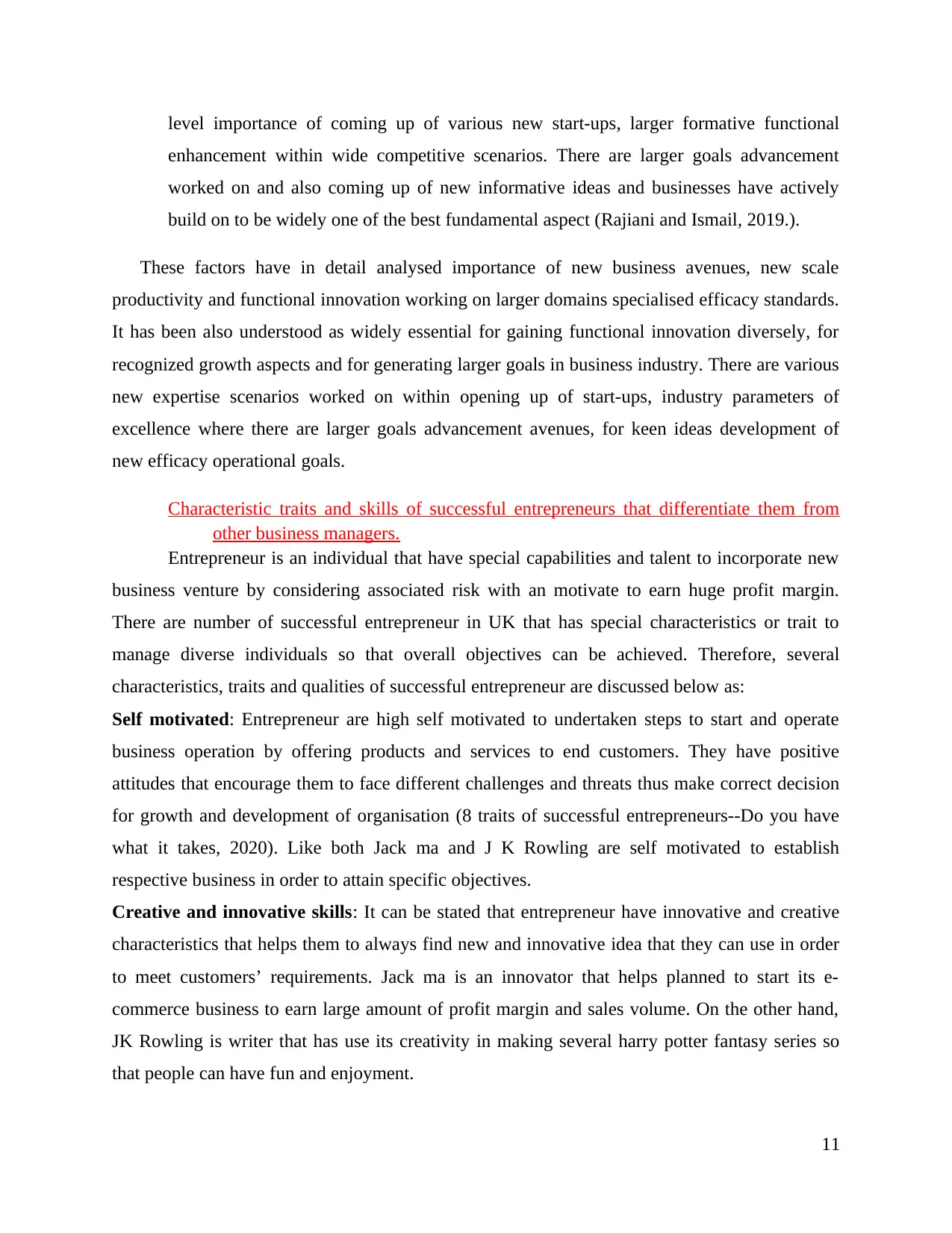
level importance of coming up of various new start-ups, larger formative functional
enhancement within wide competitive scenarios. There are larger goals advancement
worked on and also coming up of new informative ideas and businesses have actively
build on to be widely one of the best fundamental aspect (Rajiani and Ismail, 2019.).
These factors have in detail analysed importance of new business avenues, new scale
productivity and functional innovation working on larger domains specialised efficacy standards.
It has been also understood as widely essential for gaining functional innovation diversely, for
recognized growth aspects and for generating larger goals in business industry. There are various
new expertise scenarios worked on within opening up of start-ups, industry parameters of
excellence where there are larger goals advancement avenues, for keen ideas development of
new efficacy operational goals.
Characteristic traits and skills of successful entrepreneurs that differentiate them from
other business managers.
Entrepreneur is an individual that have special capabilities and talent to incorporate new
business venture by considering associated risk with an motivate to earn huge profit margin.
There are number of successful entrepreneur in UK that has special characteristics or trait to
manage diverse individuals so that overall objectives can be achieved. Therefore, several
characteristics, traits and qualities of successful entrepreneur are discussed below as:
Self motivated: Entrepreneur are high self motivated to undertaken steps to start and operate
business operation by offering products and services to end customers. They have positive
attitudes that encourage them to face different challenges and threats thus make correct decision
for growth and development of organisation (8 traits of successful entrepreneurs--Do you have
what it takes, 2020). Like both Jack ma and J K Rowling are self motivated to establish
respective business in order to attain specific objectives.
Creative and innovative skills: It can be stated that entrepreneur have innovative and creative
characteristics that helps them to always find new and innovative idea that they can use in order
to meet customers’ requirements. Jack ma is an innovator that helps planned to start its e-
commerce business to earn large amount of profit margin and sales volume. On the other hand,
JK Rowling is writer that has use its creativity in making several harry potter fantasy series so
that people can have fun and enjoyment.
11
enhancement within wide competitive scenarios. There are larger goals advancement
worked on and also coming up of new informative ideas and businesses have actively
build on to be widely one of the best fundamental aspect (Rajiani and Ismail, 2019.).
These factors have in detail analysed importance of new business avenues, new scale
productivity and functional innovation working on larger domains specialised efficacy standards.
It has been also understood as widely essential for gaining functional innovation diversely, for
recognized growth aspects and for generating larger goals in business industry. There are various
new expertise scenarios worked on within opening up of start-ups, industry parameters of
excellence where there are larger goals advancement avenues, for keen ideas development of
new efficacy operational goals.
Characteristic traits and skills of successful entrepreneurs that differentiate them from
other business managers.
Entrepreneur is an individual that have special capabilities and talent to incorporate new
business venture by considering associated risk with an motivate to earn huge profit margin.
There are number of successful entrepreneur in UK that has special characteristics or trait to
manage diverse individuals so that overall objectives can be achieved. Therefore, several
characteristics, traits and qualities of successful entrepreneur are discussed below as:
Self motivated: Entrepreneur are high self motivated to undertaken steps to start and operate
business operation by offering products and services to end customers. They have positive
attitudes that encourage them to face different challenges and threats thus make correct decision
for growth and development of organisation (8 traits of successful entrepreneurs--Do you have
what it takes, 2020). Like both Jack ma and J K Rowling are self motivated to establish
respective business in order to attain specific objectives.
Creative and innovative skills: It can be stated that entrepreneur have innovative and creative
characteristics that helps them to always find new and innovative idea that they can use in order
to meet customers’ requirements. Jack ma is an innovator that helps planned to start its e-
commerce business to earn large amount of profit margin and sales volume. On the other hand,
JK Rowling is writer that has use its creativity in making several harry potter fantasy series so
that people can have fun and enjoyment.
11
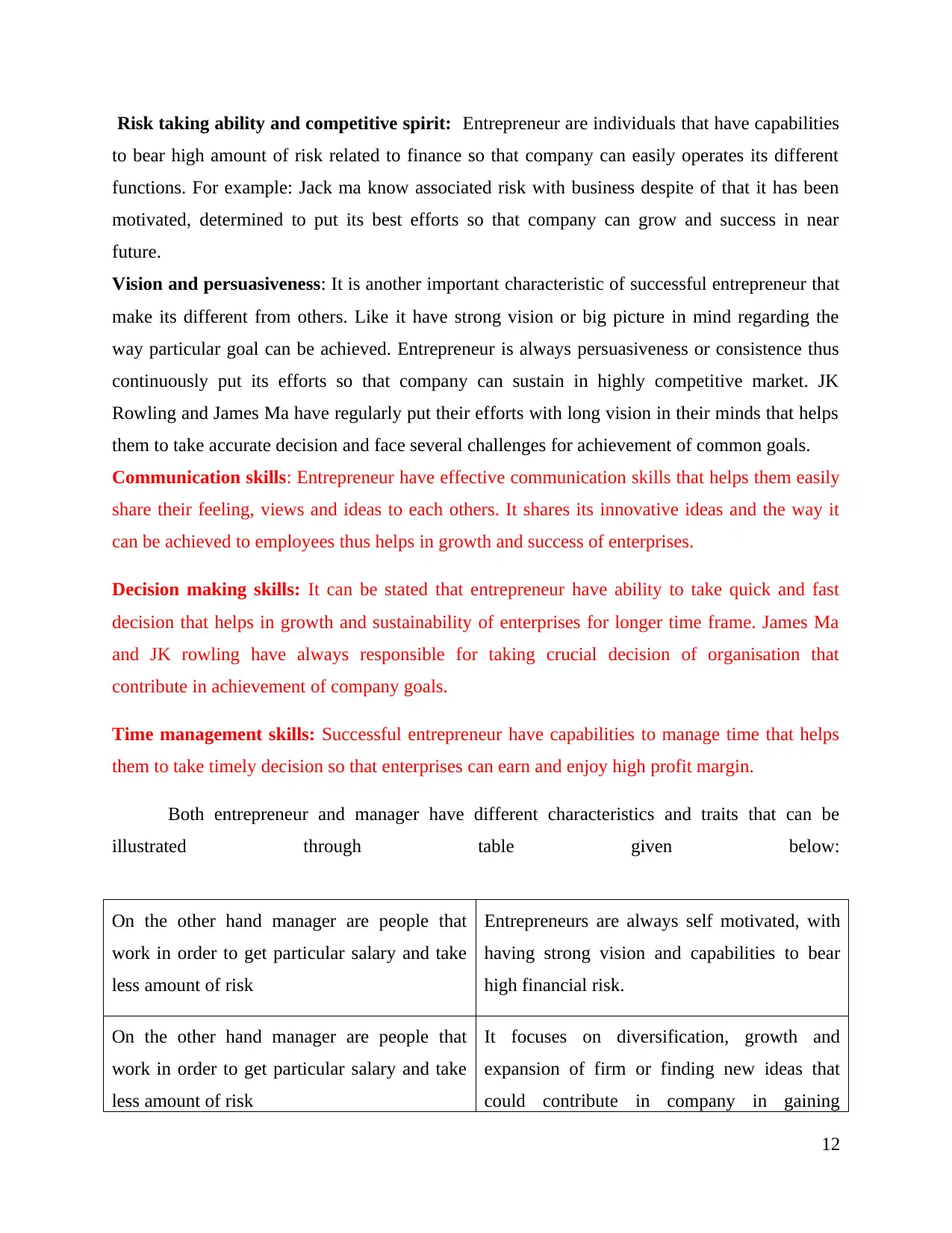
Risk taking ability and competitive spirit: Entrepreneur are individuals that have capabilities
to bear high amount of risk related to finance so that company can easily operates its different
functions. For example: Jack ma know associated risk with business despite of that it has been
motivated, determined to put its best efforts so that company can grow and success in near
future.
Vision and persuasiveness: It is another important characteristic of successful entrepreneur that
make its different from others. Like it have strong vision or big picture in mind regarding the
way particular goal can be achieved. Entrepreneur is always persuasiveness or consistence thus
continuously put its efforts so that company can sustain in highly competitive market. JK
Rowling and James Ma have regularly put their efforts with long vision in their minds that helps
them to take accurate decision and face several challenges for achievement of common goals.
Communication skills: Entrepreneur have effective communication skills that helps them easily
share their feeling, views and ideas to each others. It shares its innovative ideas and the way it
can be achieved to employees thus helps in growth and success of enterprises.
Decision making skills: It can be stated that entrepreneur have ability to take quick and fast
decision that helps in growth and sustainability of enterprises for longer time frame. James Ma
and JK rowling have always responsible for taking crucial decision of organisation that
contribute in achievement of company goals.
Time management skills: Successful entrepreneur have capabilities to manage time that helps
them to take timely decision so that enterprises can earn and enjoy high profit margin.
Both entrepreneur and manager have different characteristics and traits that can be
illustrated through table given below:
On the other hand manager are people that
work in order to get particular salary and take
less amount of risk
Entrepreneurs are always self motivated, with
having strong vision and capabilities to bear
high financial risk.
On the other hand manager are people that
work in order to get particular salary and take
less amount of risk
It focuses on diversification, growth and
expansion of firm or finding new ideas that
could contribute in company in gaining
12
to bear high amount of risk related to finance so that company can easily operates its different
functions. For example: Jack ma know associated risk with business despite of that it has been
motivated, determined to put its best efforts so that company can grow and success in near
future.
Vision and persuasiveness: It is another important characteristic of successful entrepreneur that
make its different from others. Like it have strong vision or big picture in mind regarding the
way particular goal can be achieved. Entrepreneur is always persuasiveness or consistence thus
continuously put its efforts so that company can sustain in highly competitive market. JK
Rowling and James Ma have regularly put their efforts with long vision in their minds that helps
them to take accurate decision and face several challenges for achievement of common goals.
Communication skills: Entrepreneur have effective communication skills that helps them easily
share their feeling, views and ideas to each others. It shares its innovative ideas and the way it
can be achieved to employees thus helps in growth and success of enterprises.
Decision making skills: It can be stated that entrepreneur have ability to take quick and fast
decision that helps in growth and sustainability of enterprises for longer time frame. James Ma
and JK rowling have always responsible for taking crucial decision of organisation that
contribute in achievement of company goals.
Time management skills: Successful entrepreneur have capabilities to manage time that helps
them to take timely decision so that enterprises can earn and enjoy high profit margin.
Both entrepreneur and manager have different characteristics and traits that can be
illustrated through table given below:
On the other hand manager are people that
work in order to get particular salary and take
less amount of risk
Entrepreneurs are always self motivated, with
having strong vision and capabilities to bear
high financial risk.
On the other hand manager are people that
work in order to get particular salary and take
less amount of risk
It focuses on diversification, growth and
expansion of firm or finding new ideas that
could contribute in company in gaining
12
⊘ This is a preview!⊘
Do you want full access?
Subscribe today to unlock all pages.

Trusted by 1+ million students worldwide
1 out of 19
Related Documents
Your All-in-One AI-Powered Toolkit for Academic Success.
+13062052269
info@desklib.com
Available 24*7 on WhatsApp / Email
![[object Object]](/_next/static/media/star-bottom.7253800d.svg)
Unlock your academic potential
Copyright © 2020–2026 A2Z Services. All Rights Reserved. Developed and managed by ZUCOL.





